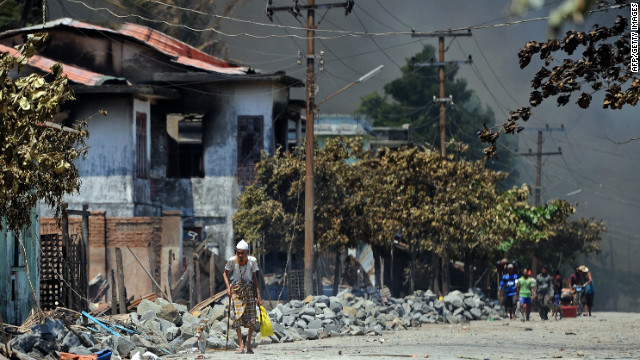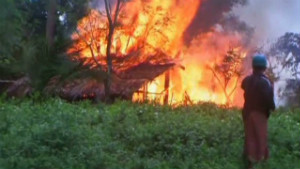June 13, 2012 -- Updated 0819 GMT (1619 HKT)

Evacuated Muslims walk past burnt houses in Sittwe, capital of Myanmar's western state of Rakhine, on Tuesday.
STORY HIGHLIGHTS
- More than 20 people have been killed in unrest in western Myanmar
- The government has declared a state of emergency in Rakhine State
- The clashes are between the state's Buddhist and Muslim populations
- The U.N. and rights groups call on Bangladesh to accept refugees from the violence
(CNN) -- The U.N. envoy to Myanmar arrived Wednesday
in the Southeast Asian country's western state of Rakhine, where
sectarian violence in recent days has killed more than 20 people and
destroyed hundreds of homes.
Vijay Nambiar, the
special adviser for Myanmar to U.N. Secretary-General Ban Ki-moon, is in
Rakhine for talks with local officials, said Aye Win, the U.N. national
information officer in the country.
Violent clashes between
Buddhists and Muslims prompted the government of President Thein Sein to
declare a state of emergency in Rakhine on Sunday, calling in the
military to help impose order.
The turmoil underscores
the fragility of Thein Sein's efforts to move the country along a path
toward democracy and pursue reconciliation among its different ethnic
groups after he took power last year.
The unrest in the western
coastal area of Myanmar, which borders Bangladesh, has left 21 people
dead and thousands seeking shelter in refugee camps, Myanmar state TV
reported Tuesday evening.
The violence erupted
after the police detained three Muslim men in relation to the rape and
killing of a Buddhist woman late last month.
Anger over the case
fueled an attack by about 300 local people on a bus in the Taungup area
of Rakhine, killing 10 Muslim passengers on June 3, according to the New
Light of Myanmar, a government-run newspaper.
 Myanmar erupts after rape, murder report
Myanmar erupts after rape, murder report
Since then, inter-ethnic clashes have multiplied, resulting in the destruction of 1,662 houses, state TV reported.
Rakhine is home to the Rohingya, an ethnic Muslim minority who say they have been persecuted by Myanmar's ruling military junta.
That makes the
government decision to impose a state of emergency in Rakhine and call
in the army a flawed response to the current situation, according to
human rights advocates.
"For decades, the
Rohingya have routinely suffered abuses by the Burmese army, including
extrajudicial killings, forced labor, land confiscation, and restricted
freedom of movement," the nongovernmental organization Human Rights
Watch said in a statement Monday. It noted that the Buddhist Arakan people in Rakhine had also had their human rights violated by the military.
"Using the army to restore order risks arbitrary arrests, enforced disappearances and torture," the rights group said.
As a result of their treatment by the authorities, the Rohingya have long sought refuge in other places.
The United Nations has
estimated that more than 200,000 Rohingya live in legal limbo in
Bangladesh. Over the years, Rohingya have fled by sea in small boats to
other countries like Thailand and Malaysia.
The United Nations and
human rights groups have called on the Bangladeshi authorities to let in
refugees fleeing the violence in Rakhine, citing reports that border
guards had turned back boats carrying people from Myanmar.
"Previously people have
been allowed in to Bangladesh for medical treatment," Adrian Edwards, a
spokesman for the Office of the U.N. High Commissioner for Refugees,
said Tuesday." We hope that such good practices will be maintained."
Efforts to obtain comment from the Bangladeshi government were not successful on Wednesday.
The unrest runs counter
to the efforts of Thein Sein's administration to seek reconciliation
with Myanmar's different ethnic groups and move the country toward more
democratic governance. Western governments have rewarded progress in the
country over the past year by easing economic sanctions.
U.S. Secretary of State
Hillary Clinton expressed concern about the situation in Rakhine on
Monday, calling on "all parties to exercise restraint and immediately
halt all attacks."
In a statement, Clinton urged the Myanmar authorities
"to work with local leaders -- together with Muslim, Buddhist, and
ethnic representatives, including Rohingya -- to halt the ongoing
violence, begin a dialogue toward a peaceful resolution, and ensure an
expeditious and transparent investigation into these incidents that
respects due process and the rule of law."
The United Nations said Monday that it was temporarily withdrawing some staff from Rakhine because of the unstable situation.
Source: CNN
No comments:
Post a Comment